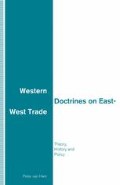Abstract
It is a law of physics that close contact between rapidly moving bodies results in friction; a scientific notion corroborated by the saying ‘familiarity breeds contempt’. In the social sciences and humanities, however, such ‘laws’ do not exist. People and societies tend to evade rigid regularities; they are not subject to one, relatively simple all-embracing law which guides their behavior. Consequently, apart from ‘familiarity breeds contempt’, one could suggest a plethora of other hypotheses, such as intensive communication leads to mutual understanding, or trade fosters peace. Both postulates are based on pre-theory, rather commonsensical observations on the relationship between the level of contact and the amount of conflict among people and nations. We will here focus on the theoretical presumptions pertaining to the strategies of East-West economic interdependence.
Access this chapter
Tax calculation will be finalised at checkout
Purchases are for personal use only
Preview
Unable to display preview. Download preview PDF.
Notes
Ernst B. Haas, Beyond the Nation-State: Functionalism and International Organization (1964).
Herbert C. Kelman (ed.), International Behavior: A Social-Psychological Analysis (1965).
Senghaas-Knobloch, Frieden durch Integration and Assoziation. Literaturbericht and Problemstudien (1969) pp. 16, 17.
Groom, ‘The Functionalist Approach and East/West Cooperation in Europe’, in Journal of Common Market Studies (1975) p. 22.
Vogel, ‘Improving East-West Relations in the late 1980s: Economic Relations’, in Lynch and McNamara (eds), Changing Dimensions of East-West Relations (1987) p. 54.
Peter G. Peterson: ‘U.S.-Soviet Commercial Relationships in a New Era’, August 1972.
R. S. Ingersoll before the Senate Committee on Commerce, 12 December 1975, in Department of State Bulletin, 19 January 1976, pp. 90, 91.
Yergin, ‘Politics and Soviet-American Trade: The Three Questions’, in Foreign Affairs (1977) p. 519.
Gutman, ‘Die Argumente vom Wandel durch Handel’, in Schüller and Wagner (eds), Außen wirtschaftspolitik and Stabilisierung von Wirtschaftssystemen (1980) p. 53.
Baldwin, ‘Power and Social Exchange’, in The American Political Science Review (1978), especially pp. 1234–1238.
Andrén and Birnbaum (eds), Beyond Détente: Prospects for East-West Co-operation and Security in Europe (1976) p. 90.
Maghroori and Ramberg, Globalism Versus Realism (1982).
Mintany, ‘The Functionalist Approach in Historical Perspective’, in International Affairs (1971) pp. 532, 533.
Adler-Karlsson, Western Economic Warfare. 1947–1967 (1968).
Roth, ‘Wirtschaftsbeziehungen - COCOM - Gorbatschow’, in Die Neue Gesellschaft (1988) p. 533.
Russett and Hanson, Interests and Ideology (1975) p. 271.
Roy D. Laird and Ronald A. Francisco, in Nish Jamgotsch, Jr. (ed.), ‘The Interdependence of Agricultural Trade’, Sectors of Mutual Benefit in U.S.-Soviet Relations (1985) p. 95.
Chapman (eds), Forum on U.S.-Soviet Trade Relations (1987) p. 48.
Jervis, Perception and Misperception (1976) p. 129.
Holzman and Legvold, ‘East-West Relations’ (1975) p. 275.
Osgood, War or Surrender (1962) p. 6.
Etzioni, Hard Way to Peace (1962) p. 84.
Osgood, War or Surrender (1962).
Marshall D. Shulman, Beyond the Cold War (1966) chapter 5, esp. pp. 90, 91.
Keohane and Nye, Power and Interdependence (1977) p. 8.
Keohane and Nye, ‘Power and Interdependence Revisited’, in International Organization (1987) p. 730.
Baldwin, ‘Interdependence and Power: A Conceptual Analysis’, in International Organization (1980) p. 491.
Hoffmann, ‘Notes on the Elusiveness of Modem Power’, in International Journal (1975) p. 192.
Waltz, ‘The Myth of National Interdependence’, in Kindleberger, The International Corporation (1970) p. 210.
Rode and Jacobsen (eds), Economic Warfare or Détente? An Assessment of East-West Economic Relations in the 1980s (1985) p. 6.
Author information
Authors and Affiliations
Copyright information
© 1992 Peter van Ham
About this chapter
Cite this chapter
van Ham, P. (1992). Economic Interdependence: The Functionalist View on East-West Economic Relations. In: Western Doctrines on East-West Trade. Palgrave Macmillan, London. https://doi.org/10.1007/978-1-349-12610-1_2
Download citation
DOI: https://doi.org/10.1007/978-1-349-12610-1_2
Publisher Name: Palgrave Macmillan, London
Print ISBN: 978-1-349-12612-5
Online ISBN: 978-1-349-12610-1
eBook Packages: Palgrave Economics & Finance CollectionEconomics and Finance (R0)

